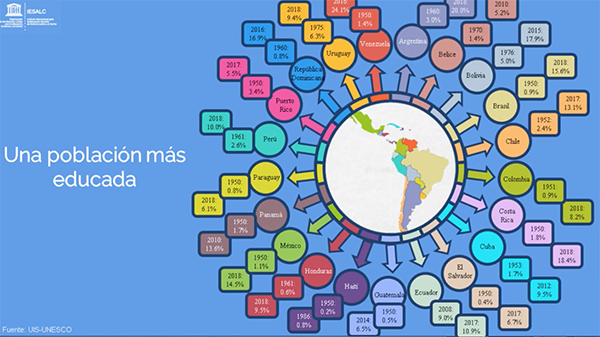Challenges of a new higher education model

The second day of the CRES+5, the follow-up meeting to the Third Regional Conference on Higher Education, was marked by a debate on regional integration in Latin America and the Caribbean, and the construction of a more equal and equitable higher education system. In the meetings, six thematic axes were analyzed: the precariousness of the teaching profession, the effects of COVID on higher education, women in education, financing and governance, university autonomy and the future of education in Latin America and the Caribbean.
The debates pointed to the need for governments to make a long-term effort to restore education to pre-pandemic levels, and then to improve working conditions and pay for education professionals in order to attract capable professionals and encourage them to stay in the classroom. In the opinion of those taking part in the debates, it is also necessary to guarantee the place of women, who are now the majority in education, by combating discrimination and threats to the profession. Regarding the autonomy of higher education institutions, the assessment is that it can only be achieved with public funding guaranteed by law, which would allow for a real change in the region’s higher education model. For Chile’s Undersecretary for Higher Education, Victor Orellana, “the message for Latin America is that the market is not the answer to our problems, but rather the guarantee of the right to education, which does not imply replicating public university models from other historical moments. Today we need, for example, more modern funding, in the sense of better instruments to insert into the system, we demand a more effective link between productive development and knowledge, we demand a greater relationship between our academic offer and the social, cultural and productive needs of the countries. We’re moving in this direction, but it’s not easy to move away from a model that places profit as the main driving force behind higher education. We are asking the continent to agree on the right to education and the link between higher education and development, beyond political banners. Guaranteeing the right to education and assuming that higher education is a fundamentally public good and not a market good, is not a banner of one sector, it is an international consensus, a consensus that has been reached with a lot of effort, in which governments from different political groups participate. We bring this message, to increase our Latin American vocation, as President Boric requested, to increase our commitment to Latin America and to be part of this process that we hope will lead our countries to development.”
Professor Nilma Lino Gomes, former minister for women, racial equality and human rights, stressed in her lecture that it is possible to think of a differentiated higher education model that respects and includes the knowledge and know-how of important segments of society, such as indigenous, Afro-Latin American and Caribbean leaders, especially within a scenario of full democratic rule of law. But she points out that this is no easy task, at a time when conservative and retrograde movements in society in various parts of the world are growing stronger and promoting confrontation with progressive sectors of civil society, as is the case here in Brazil. “Society is polarized, as we have seen many analysts say. A polarization that I see has reached a certain apex, because it has a political representation in Brazil that it didn’t have before, in the way that we have today. Basically, if we consider that we are a society with a colonial, slave-owning past, with an attempt at indigenous genocide, what we call polarization today are conceptions that have always existed, but which are articulated with market fundamentalism, religious fundamentalism, a large hegemonic media, and by political representation.
New network for higher education policies
On Thursday, as part of the CRES+5, UNESCO IESALC held the first meeting of the Network of Higher Education Policymakers and Managers (RedPES) in Latin America and the Caribbean. This new body brings together high-level representatives from the region’s higher education systems to discuss policy development in the sector, compare experiences, ideas and good practices, establish links and build collaborations with international peers.
The meeting laid the foundations for the launch of RedPES, discussing members’ priorities, areas of interest and preferred forms of participation. The Higher Education Policy Hub, a dynamic UNESCO IESALC portal, was also presented, offering a set of tools and resources for policymakers and stakeholders in higher education, with coverage covering more than 150 countries, as well as access to a range of analytical publications and links to podcasts and meetings related to policy matters.
According to Dameon Black, President of the UNESCO IESALC Governing Council, “This is an excellent initiative. It will provide a forum through which valuable information and learning can be shared for the benefit of higher education systems in Latin America and the Caribbean. UNESCO IESALC is to be commended.”
Closing of the CRES+5
This Friday, the CRES+5 reaches its final day with the Higher Education Policy Forum. There will be a meeting in plenary to draw up the final document of the meeting, with an analysis of the progress made since 2018 and proposals for building a new model of higher education for the Latin American and Caribbean region.
RELATED ITEMS








